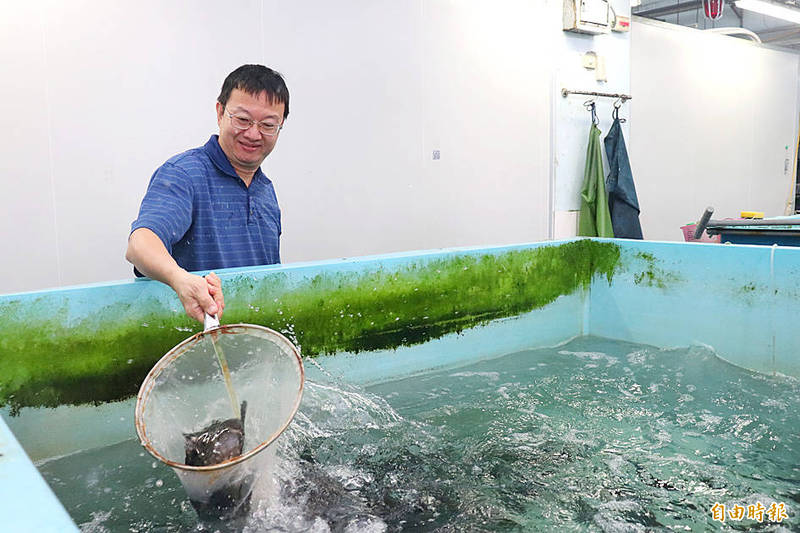《TAIPEI TIMES》 Researchers heal burns with fish peptide

Research fellow Chen Jyh-yih of the Marine Research Station at Academia Sinica’s Institute of Cellular and Organismic Biology catches a grouper at his lab in Yilan County on Thursday last week. Photo: Lin Ching-lun, Taipei Times
ANTIBACTERIAL: The Academia Sinica team’s success made them stand out among more than 700 teams applying to participate in this week’s Taiwan Innotech Expo
By Lin Ching-lun, Chien Hui-ju and Dennis Xie / Staff reporters, with staff writer
Academia Sinica research has found that collagencin, an antibacterial peptide from fish collagen, shows great potential in the treatment of burns by accelerating healing and helping to prevent scarring.
Five years ago, a team — led by Research fellow Chen Jyh-yih (陳志毅) of the Marine Research Station at Academia Sinica’s Institute of Cellular and Organismic Biology — found that fish have special body mucus that helps wounds to heal underwater and prevents bacterial infections.
Following up on this research, the team found that collagencin from groupers kills bacteria by dissolving their outer and plasma membranes, Chen said on Thursday, adding that the peptide also has mechanisms that infiltrate and disrupt the bacterial cells’ lipid bilayers.
In stage 1 of a four-part experiment, collagencin proved to have healing properties on mice burns, which healed in seven to 14 days without scarring, while in stage 2, collagencin similarly helped to heal pig burns, which healed in about 25 days, he said.
The success of the first two stages made the team stand out among more than 700 research teams applying to participate in the Taiwan Innotech Expo, an annual exhibition of innovative technologies hosted by the government in Taipei, which opened on Thursday and closes today, he said.
In stage 3, collagencin is to be tested on monkeys and the last stage is the clinical trials, Chen said.
If all of the stages go well, a collagencin ointment would be developed that could treat burn victims, but it could take about five years to develop the ointment, Chen added.
Common causes of death for those with severe burn injuries include decreased blood flow, abnormal nutritional support, and wound sepsis or other bacterial infections, Chen said, adding that collagencin-based treatments help heal wounds by promoting the growth of new blood vessels and preventing scarring.
In related news, the Council of Agriculture (COA) has developed technology to extract collagen from pig lungs, which mostly go to waste as few people eat them.
The research team — COA Livestock Research Institute members Chen Wen-hsien (陳文賢) and Tu Jung-chen (?榮珍), and Tseng Tsai-fu (曾再富), a professor in National Chiayi University’s department of animal science — said that after developing the process for extracting 1g of collagen per 100g of pig lungs, it transferred the technology to a private firm this year.
Research and development with bone biomaterials would benefit from the process, as animal collagen works best with such biomaterials, Tu said.
新聞來源:TAIPEI TIMES
















